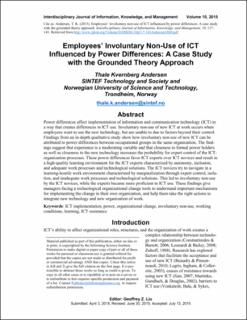| dc.contributor.author | Andersen, Thale Kvernberg | |
| dc.date.accessioned | 2020-06-22T10:44:44Z | |
| dc.date.available | 2020-06-22T10:44:44Z | |
| dc.date.created | 2015-09-01T14:40:51Z | |
| dc.date.issued | 2015 | |
| dc.identifier.citation | Interdisciplinary Journal of Information, Knowledge, and Management. 2015, 10 117-143. | en_US |
| dc.identifier.issn | 1555-1229 | |
| dc.identifier.uri | https://hdl.handle.net/11250/2658997 | |
| dc.description.abstract | Power differences affect implementation of information and communication technology (ICT) in a way that creates differences in ICT use. Involuntary non-use of new ICT at work occurs when employees want to use the new technology, but are unable to due to factors beyond their control. Findings from an in-depth qualitative study show how involuntary non-use of new ICT can be attributed to power differences between occupational groups in the same organization. The findings suggest that experience is a moderating variable and that closeness to formal power holders as well as closeness to the new technology increases the probability for expert control of the ICT-organization processes. These power differences favor ICT experts over ICT novices and result in a high-quality learning environment for the ICT experts characterized by autonomy, inclusion, and adequate work processes and technological solutions. The ICT novices try to navigate in a learning-hostile work environment characterized by marginalization through expert control, isolation, and inadequate work processes and technological solutions. This led to involuntary non-use by the ICT novices, while the experts became more proficient in ICT use. These findings give managers facing a technological organizational change tools to understand important mechanisms for implementing the change in their own organization, and help them take the right actions to integrate new technology and new organization of work. | en_US |
| dc.language.iso | eng | en_US |
| dc.publisher | Informing Science Institute | en_US |
| dc.relation.uri | http://www.ijikm.org/Volume10/IJIKMv10p117-143Andersen1880.pdf | |
| dc.rights | Navngivelse-Ikkekommersiell 4.0 Internasjonal | * |
| dc.rights.uri | http://creativecommons.org/licenses/by-nc/4.0/deed.no | * |
| dc.subject | ICT implementation | en_US |
| dc.subject | Power | en_US |
| dc.subject | Organizational change | en_US |
| dc.subject | Involuntary non-use | en_US |
| dc.subject | Working conditions | en_US |
| dc.title | Employees' involuntary non-use of ICT influenced by power differences: A case study with the grounded theory approach | en_US |
| dc.type | Journal article | en_US |
| dc.type | Peer reviewed | en_US |
| dc.description.version | publishedVersion | en_US |
| dc.rights.holder | All articles of this journal, whether published in the past or future, are now licensed to you under a Creative Commons By-NC license and copyright to articles is returned and retained by their respective authors. | en_US |
| dc.source.pagenumber | 117-143 | en_US |
| dc.source.volume | 10 | en_US |
| dc.source.journal | Interdisciplinary Journal of Information, Knowledge, and Management | en_US |
| dc.identifier.cristin | 1261258 | |
| cristin.unitcode | 7401,90,30,0 | |
| cristin.unitname | Teknologiledelse | |
| cristin.ispublished | true | |
| cristin.fulltext | original | |
| cristin.qualitycode | 1 | |

